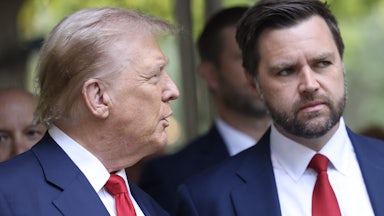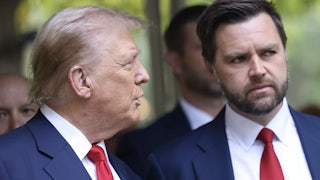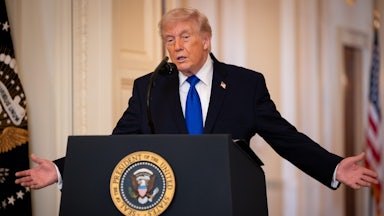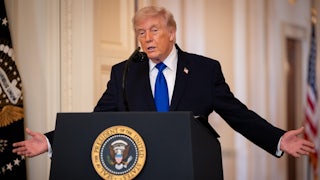In the aftermath of Donald Trump’s disastrous performance in his first—and perhaps only—debate against Kamala Harris, Republicans kept bemoaning their candidate’s lack of discipline. Instead of talking about inflation or immigration or, for that matter, any basic needs or concerns of ordinary Americans, Trump spent 90 minutes raving about crowd sizes and lying about immigrants eating dogs and cats. “He [is] right on policy but can’t keep to a message,” one House Republican told The Hill. “Many are disappointed he couldn’t stay focused or land a punch.”
Of the many delusions and fantasies of the Trump era, the notion that he will at some future date emerge from his chrysalis as a disciplined and focused statesman is one of the dumbest and most persistent. When pressed, Trump will always talk about himself. Bored by the minutiae of politics, he will, given even the slightest opportunity, veer wildly off course. That he would say some of the most outrageous and extreme things that have ever been said in an American political debate is, and always has been, a given: It is what he has been doing now for nearly a decade. Give him the choice between talking about inflation and a minor slight about people being bored at his rallies, Trump will dispute that the people at his rallies are bored every single time.
To a large extent, his political project is built on his failure to stay on message, which only reifies the fact that he is not like other politicians. His authenticity—the core of his appeal—is built on ill-discipline. Trump tells voters he represents a break from politics as usual. He proves it by saying things—often crazy, extreme, and/or deeply stupid things—that other politicians, very much including his fiercest and most loyal backers, won’t.
Staying on message, in other words, isn’t Donald Trump’s deal. But it is JD Vance’s. Tuesday’s vice presidential debate between the Ohio senator and Kamala Harris’s running mate, Minnesota Governor Tim Walz, was in many ways a do-over of the first debate. Vance was disciplined. He knew his talking points, and he hit them again and again. He gish-galloped with real authority. He got revenge on many of his haters by reminding many liberals why they actually liked the older version of Vance, the one who criticized the man who is now his running mate: Vance is pretty good on TV—provided you agree with what he’s saying.
In the depressing world of American punditry, where style matters more than substance, Vance is already being anointed as the “winner.” He was assured, he didn’t fall down any rabbit holes; in a few instances, when addressing Walz personally, he seemed almost decent—a word you would only use to describe him in rare occasions since his Trumpist turn. JD Vance’s biggest job in this debate was to seem normal.
He almost got there.
Vance is already being praised in some circles—particularly on cable news—for his discipline and cordiality. We will hear, again and again, about how this was the performance Trump should have given but didn’t.
But that is the superficial view of what transpired. Substantively, the political ideas that Vance delivered were not just the more radical of the two men’s on the debate stage Wednesday night, they were arguably more extreme than the ideas Trump promoted when it was his turn last month.
At every instance, Vance blamed America’s ills—the cost of housing, illegal drugs, violent crime—on immigrants. He endorsed deporting millions and refused to rule out violently separating immigrant children from their parents. He lied through his teeth about supporting a national abortion ban and the (legal) immigration status of the Haitians in Springfield, Ohio, he has viciously denigrated for weeks. He pushed a health care “policy” that would ruin the lives of millions of elderly people and people with preexisting conditions. He pushed anti-vaccine positions with no scientific basis that will undermine public health. In response to a question about school shootings, he suggested strengthening “doors and windows.” And he endorsed Donald Trump’s lies about the 2020 presidential election. So yes, Vance had message discipline—but that was the message.
Tonight was a good reminder that Vance—arguably more than any other Republican—embodies the future of the Republican Party. A Yale-educated lawyer, he has deep ties to both Silicon Valley oligarchs and the think-tank brahmins on the right. Although he has attempted to obscure—and at times literally suppress—his deep ties to the Heritage Foundation’s radical Project 2025, he has done as much as anyone to intellectually backfill Trumpism’s many holes with the pages of that manifesto. Regardless of what happens in November, Vance’s debate performance should leave no doubt about where his party is headed: somewhere deeply dark and authoritarian.
All of which forces us to reckon with another one of those pesky, persistent inquiries of the Trump era: What is Trumpism without Trump? Is such a thing even possible? Trumpism is highly dependent on its leader’s charisma and his outsider status. Aside from its vehement xenophobia and old-fashioned devotion to tariffs, the appeal of Trumpism is rooted in his lack of expertise—and often interest—in most areas of policy. Governance requires doing many things that bore Donald Trump, and this translates: His base is bored with governing too!
Since his late-stage conversion to the Trumpian faith, Vance has done as much to flesh out his political program as anyone on the political right. On Tuesday, we saw the result: a remarkably extreme future of forced births and the military being deployed on American streets to deport people who have been living here for decades and who, in many instances, are legal citizens who are entitled to be here. This is Donald Trump’s political project, yes. But it is now JD Vance’s.
The electoral appeal of Trumpism without Trump is still untested. The available data we have in the form of competitive Senate and House races—and, for that matter, in the form of Vance’s staggeringly bad favorability ratings—suggests any successor will struggle to recreate both the vibe and the coalition that Trump has built. Vance was disciplined on Tuesday, but he was also fortunate: Tim Walz started the debate nervously and, perhaps surprised by Vance’s friendly, at time self-effacing demeanor, often let the Ohio senator off the hook. Still, there was nothing to suggest that Vance is the obvious successor to Trump or, for that matter, a generational talent.
What was clear, however, is that Vance’s approach to politics is not going away anytime soon—perhaps not even if Trump and Vance are defeated in November. It will likely not involve wild digressions about crowd sizes, but it will involve calculated lies demonizing immigrants. It will be relentlessly focused on remaking America, politically and culturally, and on punishing anyone deemed to be an enemy of that project: immigrants, women, liberals. It may not feature raucous rallies and digressions about Hannibal Lecter or electrocuting sharks. But it will be built on relentless lies about its true aims. The future of the GOP is locked in. It will arrive, as Vance did on Tuesday, with a smile.










